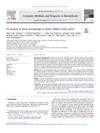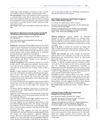 1 citations,
June 2021 in “Computer methods and programs in biomedicine”
1 citations,
June 2021 in “Computer methods and programs in biomedicine” Children with cancer had slightly more unusual facial shapes than healthy kids, but not enough to easily tell them apart.
 39 citations,
May 2011 in “Human Immunology”
39 citations,
May 2011 in “Human Immunology” Genetics play a role in acne, but how exactly they contribute is not fully understood.
 111 citations,
November 2010 in “Human Reproduction”
111 citations,
November 2010 in “Human Reproduction” South Asian women with PCOS are more likely to have metabolic issues and central obesity, and simple measures like waist size and blood pressure can help identify these risks early.
[object Object]  31 citations,
October 2002 in “Dermatologic Surgery”
31 citations,
October 2002 in “Dermatologic Surgery” Minoxidil helps stabilize hair loss, increase density, and reduce shedding after hair transplant surgery.
 May 2019 in “Small Animal Dermatology”
May 2019 in “Small Animal Dermatology” The dog had sebaceous adenitis, treated with ciclosporin, leading to some hair regrowth.
 March 2020 in “QJM: An International Journal of Medicine”
March 2020 in “QJM: An International Journal of Medicine” SVF and PRP improve hair loss, but SVF causes more side effects.
 26 citations,
June 2014 in “Fertility and Sterility”
26 citations,
June 2014 in “Fertility and Sterility” Teens with PCOS and a mom with PCOS have higher insulin resistance and lower adiponectin levels, which could signal early metabolic problems.
 34 citations,
January 2005 in “Journal of the American Veterinary Medical Association”
34 citations,
January 2005 in “Journal of the American Veterinary Medical Association” Cyclosporine A can reduce inflammation in dogs with sebaceous adenitis, but ongoing treatment is needed.
 15 citations,
April 2008 in “Steroids”
15 citations,
April 2008 in “Steroids” The more lipophilic the progesterone derivative, the better it binds to androgen receptors and has antiandrogenic effects.
 3 citations,
January 2018 in “İstanbul Kuzey Klinikleri”
3 citations,
January 2018 in “İstanbul Kuzey Klinikleri” Hair loss was found in 37.4% of surveyed rural high-school students in Eskisehir, Turkey, affecting their quality of life, especially in general health and mental well-being.
 May 2021 in “Dermatopathology”
May 2021 in “Dermatopathology” The review emphasizes the need to recognize skin conditions that affect hair follicles and sweat glands to avoid misdiagnosis.
 110 citations,
August 2015 in “Neuropsychopharmacology”
110 citations,
August 2015 in “Neuropsychopharmacology” High-dose dutasteride reduces PMDD symptoms by stabilizing neurosteroid levels.
 2 citations,
May 2021 in “Journal of pharmaceutical and biomedical analysis”
2 citations,
May 2021 in “Journal of pharmaceutical and biomedical analysis” A new method was developed to accurately detect and measure 47 different drug ingredients in various products.
 30 citations,
October 2002 in “Journal of The American Academy of Dermatology”
30 citations,
October 2002 in “Journal of The American Academy of Dermatology” Use "female pattern hair loss" term, finasteride may help, more research needed.
 1 citations,
July 2015 in “Cambridge University Press eBooks”
1 citations,
July 2015 in “Cambridge University Press eBooks” Testosterone therapy can improve sexual function in women but long-term safety is unclear.
 20 citations,
December 2000 in “Fertility and Sterility”
20 citations,
December 2000 in “Fertility and Sterility” The N363S gene variant does not cause higher adrenal androgen levels in women with polycystic ovary syndrome.
 80 citations,
April 2018 in “Trends in Molecular Medicine”
80 citations,
April 2018 in “Trends in Molecular Medicine” Lichen Planopilaris and Frontal Fibrosing Alopecia may help us understand hair follicle stem cell disorders and suggest new treatments.
 April 2018 in “Journal of Investigative Dermatology”
April 2018 in “Journal of Investigative Dermatology” A new treatment using AGED to modulate PPAR-γ shows promise for treating scarring hair loss by protecting and repairing hair follicle cells.
 11 citations,
May 2000 in “International Journal of Dermatology”
11 citations,
May 2000 in “International Journal of Dermatology” Taking a small dose of prednisone before menstruation can almost completely prevent premenstrual acne with few side effects.
 April 2018 in “Journal of Investigative Dermatology”
April 2018 in “Journal of Investigative Dermatology” Macrophages are more involved in Lichen planopilaris than in Frontal fibrosing alopecia.
 13 citations,
May 1996 in “Archives of Disease in Childhood”
13 citations,
May 1996 in “Archives of Disease in Childhood” Siblings with signs of virilization should be tested for non-classical congenital adrenal hyperplasia, which does not affect adult height but may impact fertility and well-being if untreated.
 15 citations,
August 2017 in “Scientific Reports”
15 citations,
August 2017 in “Scientific Reports” Young men with early hair loss have slightly worse blood sugar and fat levels, suggesting possible health risks and need for monitoring.
 36 citations,
November 2018 in “American Journal of Clinical Dermatology”
36 citations,
November 2018 in “American Journal of Clinical Dermatology” Alopecia is linked to various health and mental conditions, impacts life quality, and needs medical attention beyond its cosmetic effects.
 11 citations,
January 2014 in “The Scientific World Journal”
11 citations,
January 2014 in “The Scientific World Journal” Cynatine HNS improves hair and nail quality in 90 days.
 April 2023 in “JMIR. Journal of medical internet research/Journal of medical internet research”
April 2023 in “JMIR. Journal of medical internet research/Journal of medical internet research” The EVInews database provides significantly higher quality information than web-based sources for pharmacists.
 March 2024 in “Research Square (Research Square)”
March 2024 in “Research Square (Research Square)” Combining genetic and physical trait analysis improves diagnosis accuracy for monogenic diabetes.
1 citations,
November 2022 in “Molecules/Molecules online/Molecules annual” Some calcium supplements have more calcium than their labels say, and a few have less.
[object Object]  12 citations,
August 2019 in “BMC Medical Genetics”
12 citations,
August 2019 in “BMC Medical Genetics” Certain MC4R gene variants are linked to higher BMI in obese women with PCOS but do not cause PCOS.
 14 citations,
August 2019 in “BioMed Research International”
14 citations,
August 2019 in “BioMed Research International” Belly fat is the main predictor of nonalcoholic fatty liver disease in both women with Polycystic ovary syndrome and healthy women.
27 citations,
January 2020 in “Acta dermatovenerologica Alpina, Pannonica et Adriatica (Tiskana izd.)” Healthcare workers in Turkey experienced more skin problems due to frequent handwashing and wearing masks and gloves during the COVID-19 outbreak.




























